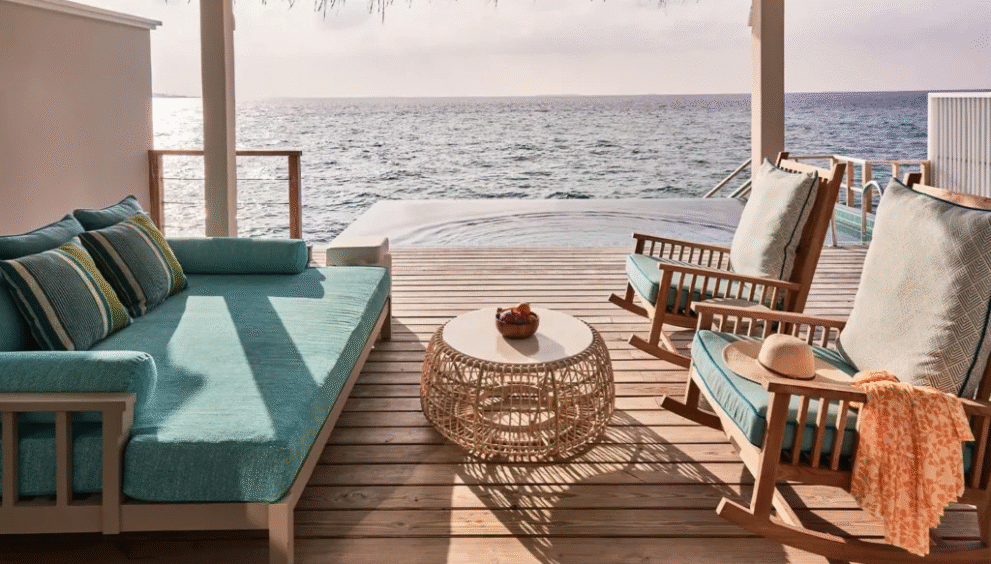The Future of Green Travel in Maldives: What’s Coming by 2030

The Maldives, a paradise of turquoise lagoons, overwater bungalows, and pristine coral reefs, has long been one of the world’s most iconic luxury travel destinations. But as global travelers increasingly prioritize sustainability and eco-conscious tourism, the Maldives is entering a transformative era. With the growing threat of climate change, rising sea levels, and environmental degradation, the country is at the forefront of reshaping its tourism model to ensure both its survival and its continued allure. By 2030, green travel in the Maldives will look very different, blending luxury with responsibility, and conservation with innovation.
Today’s travelers are not just looking for crystal-clear waters and endless sunshine. They also want to know that their journey contributes positively to the environment and local communities. Whether it’s choosing to stay in an Ocean Pool Villa in Maldives or opting for eco-friendly excursions, tourists are becoming increasingly mindful of their footprint. This demand is pushing resorts, policymakers, and local communities to innovate, ensuring that the Maldives remains a model for sustainable tourism worldwide.
The Rising Demand for Eco-Luxury Travel
Luxury tourism in the Maldives has traditionally been about exclusivity, privacy, and indulgence. However, the definition of luxury is shifting. By 2030, eco-luxury will dominate the travel industry, with visitors expecting more than just five-star amenities. They will want solar-powered villas, zero-plastic policies, and immersive experiences that connect them with nature.
Many resorts are already moving in this direction, investing in renewable energy, organic farming, and reef conservation. In the future, sustainability will not be an optional feature; it will be the baseline. Guests will evaluate destinations not just on comfort, but also on their commitment to protecting the environment. This change reflects a broader global trend where sustainability equals status, and the Maldives is positioning itself as a leader in this movement.
Renewable Energy and Carbon-Neutral Resorts
One of the most pressing priorities for Maldivian tourism is reducing its carbon footprint. By 2030, many resorts are expected to operate almost entirely on renewable energy sources such as solar and wind power. This transition will not only minimize environmental impact but also reduce dependence on imported diesel, which has traditionally powered many islands.
Carbon-neutral resorts are no longer a dream but a necessity. Already, some pioneering properties are leading the way with solar fields, battery storage systems, and water desalination plants powered by clean energy. By the end of the decade, guests may find that every villa they stay in is powered by renewable energy, offering guilt-free luxury without compromising comfort.
Plastic-Free Maldives: Eliminating Single-Use Waste
Plastic pollution poses a significant threat to the Maldivian ecosystem. With marine life playing such a central role in tourism—from snorkeling excursions to diving with manta rays—protecting the ocean from plastic waste is critical. By 2030, the Maldives is expected to be fully plastic-free, with all resorts eliminating single-use plastics and replacing them with biodegradable alternatives.
Guests can expect refillable water stations, bamboo amenities, and reusable glass containers. These changes may seem small individually, but collectively they will have a huge impact in keeping the delicate ecosystems safe. Tourists, too, will become more conscious, actively choosing destinations that align with their values and avoiding those that fail to adopt sustainable practices.
Marine Conservation and Reef Protection
The Maldives is home to some of the world’s most vibrant coral reefs, but they are under severe threat due to coral bleaching and rising sea temperatures. By 2030, marine conservation will be one of the pillars of Maldivian tourism. Many resorts are already investing in reef restoration programs, coral nurseries, and scientific collaborations to bring life back to damaged ecosystems.In the coming years, guests will not only enjoy the beauty of coral reefs but also participate in conservation activities. Experiences like planting corals, joining guided eco-snorkeling tours, or learning about marine biology from on-site experts will become an integral part of luxury holidays. This hands-on involvement ensures travelers leave not only with memories but also with the satisfaction of contributing to preservation efforts.
Local Communities and Sustainable Tourism Practices
For sustainable travel to be successful, it must also benefit local communities. By 2030, we can expect a stronger connection between resorts and nearby islands, where travelers will be encouraged to explore authentic Maldivian culture while ensuring economic benefits are widely shared.
Future green travel in the Maldives will prioritize local sourcing, whether it’s farm-to-table dining featuring island-grown produce, traditional crafts sold at resorts, or community-led cultural experiences. This shift helps reduce imports, supports livelihoods, and creates a more balanced tourism ecosystem that is beneficial for both travelers and residents.
Water Conservation and Waste Management Innovations
Freshwater is scarce in the Maldives, and with increasing tourist arrivals, responsible water usage will be more important than ever. By 2030, travelers can expect innovative systems such as desalination powered by renewable energy, greywater recycling, and smart water monitoring systems in villas.
Waste management will also evolve significantly. Instead of relying on landfill disposal or exporting waste, resorts are likely to adopt on-site recycling facilities, composting systems, and circular economy solutions. These changes will help ensure that every stay leaves a minimal ecological footprint.
Tech-Driven Sustainability in Tourism
Technology will play a critical role in shaping the future of green travel in the Maldives. Smart resort systems will help reduce energy consumption through AI-driven climate control, automated lighting, and real-time energy monitoring. Guests may even receive personalized sustainability reports at the end of their stay, showing how their holiday contributed positively to conservation efforts.
Furthermore, digital tools will allow travelers to offset their carbon footprint instantly, book eco-certified experiences, and track the impact of their choices. By 2030, the combination of technology and sustainability will make eco-travel seamless, immersive, and deeply rewarding.
Reimagining Transport: Cleaner Journeys to Paradise
While much of the focus has been on resorts, transportation is another major contributor to the Maldives’ carbon emissions. By 2030, expect electric ferries, hybrid seaplanes, and low-emission speedboats to become more common. Innovations in green aviation may also make international flights to the Maldives more sustainable, with airlines increasingly committing to biofuels and carbon offsetting programs.
Travelers will likely be able to choose sustainable transport packages, ensuring that their entire journey—from arrival at the airport to transfer to the resort—is environmentally responsible. This shift will further solidify the Maldives as a pioneer in green tourism.
The Maldives as a Global Sustainability Leader
By 2030, the Maldives has the potential to become a global leader in sustainable tourism. Its unique geography, coupled with the urgency of climate change, makes it both a symbol of vulnerability and resilience. If the nation continues on its current path of green innovation, it could serve as a model for island nations and tourist destinations worldwide.
For travelers, this means visiting the Maldives will not just be about enjoying luxury—it will be about contributing to a living case study of how tourism and environmental preservation can coexist.
Conclusion
The Maldives is entering a defining decade, one where the future of its environment and tourism industry are deeply intertwined. By 2030, travelers can expect a destination that blends luxury with sustainability, offering eco-friendly resorts, plastic-free environments, thriving coral reefs, renewable energy systems, and deeper community engagement.
Choosing the Maldives will no longer just be about indulgence; it will be about supporting a nation that is fighting on the frontlines of climate change while setting a benchmark for the global travel industry. The next time you imagine yourself in the Maldives, picture not only the stunning beaches and turquoise waters but also the green innovations shaping the future of travel. The journey ahead is not just about preserving paradise—it’s about creating a better, more sustainable world for generations to come.




























































































































































































































































































































































































































































































































































































































































































































































































































































































































































































































































































































































































































































































































































































































































































































































































































































































































































































































































































































































































































































































































































































